U-M production updates the Roaring Twenties-set musical "The Wild Party" for the Cell Phone Age
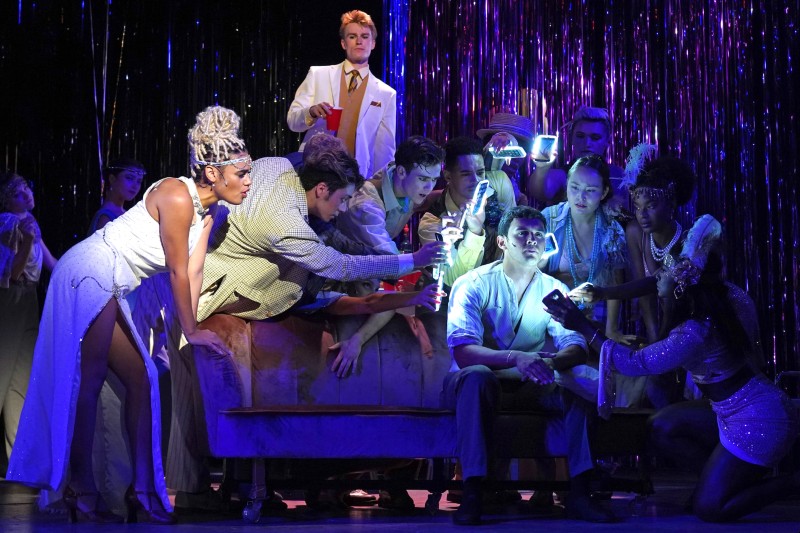
Joseph Moncore March’s 1928 book-length poem The Wild Party was a scandal at the time. March portrayed in rhythmic language the shifting landscape of sexual relations and raw desires in the Roaring ’20s as captured in a Hollywood party run amok. The book was banned in Boston and beyond.
The University of Michigan Department of Musical Theatre production of Andrew Lippa’s sung-through musical adaptation of March’s book is reset to portray a group of overprivileged Upper Eastside Manhattan teenagers.
Lippa is a 1987 University of Michigan grad who has had a very successful career as a composer and lyricist. He wrote the music and lyrics for Big Fish, The Addams Family, and three songs for You’re a Good Man Charlie Brown among others. The Wild Party premiered off-Broadway and won the Outer Critics Circle Award for best Off-Broadway musical and Lippa won the Drama Desk Award for best music.
The student cast brings high octane energy to the singing and dancing. The emotions run high in what is basically a complex love (or is it lust) triangle.
Encore Musical Theatre Company opens its new home and 13th season with "Smokey Joe’s Cafe"
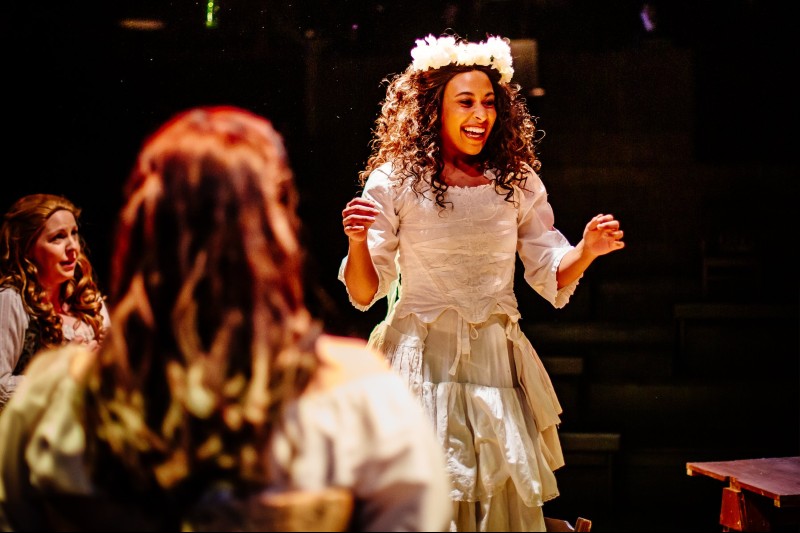
Live theater is back and the Encore Musical Theatre Company is celebrating the opening of its 13th season in its spectacular new space in Dexter and in the always rocking Smokey Joe’s Cafe.
Dan Cooney and company couldn’t have picked a better show to reignite live theater after the long pandemic drought than Smokey Joe’s Cafe, a revue tribute to the music of Jerry Leiber and Mike Stoller. It’s not the traditional musical that Encore does so well but is instead 90 minutes of pure energy, one great song after another by talented performers who take us back to those early days of rock 'n' roll and rhythm 'n' blues. Leiber and Stoller were there at the creation.
The duo of New York songwriters could and did write hit songs in nearly every genre from folk and country to rhythm and blues to the edges of pop opera. They wrote for such dynamic groups as The Drifters and The Coasters as well as for the distinct voices of the roaring Big Mama Thornton and the early soul sound of Ben E. King to Elvis Presley. And the hits just kept coming as the duo embraced the new music while also giving it their own unique voice.
Smokey Joe's is a roadhouse, the subject of one of Leiber and Stoller’s songs, and an appropriate setting for their take on the ups and downs of life and love. Though there is no storyline, director Dan Cooney’s staging suggests a loose interaction between characters from song to song. A small combo is set up as the cafe’s house band providing a rock-steady beat and great sound.
Ken Fischer makes the case for collaboration and connectivity in his book "Everybody In, Nobody Out"
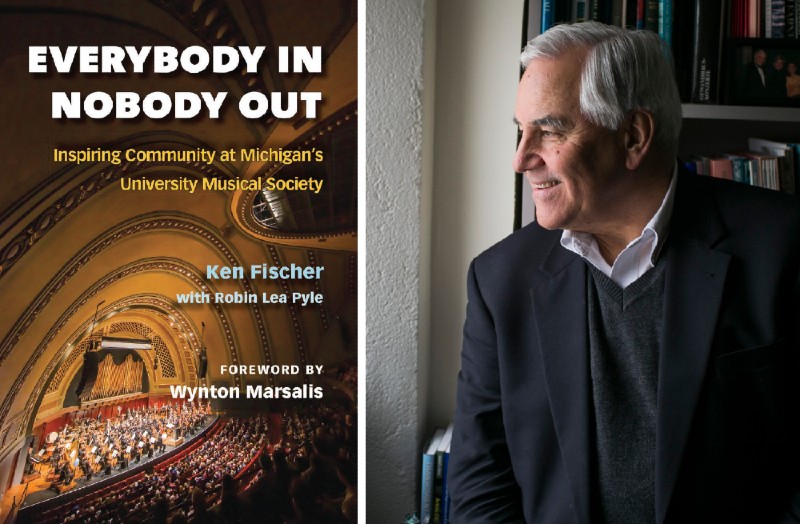
This post contains two sections: a book review and a brief interview with Ken Fischer.
On June 1, 1987, Ken Fischer became the sixth president of the University Musical Society at the University of Michigan.
That date marks the beginning of 30 years of transformation, innovation, and collaboration.
Fischer’s Everybody In, Nobody Out: Inspiring Community at Michigan’s University Musical Society written with Robin Lea Pyle is a book of many parts. It is a memoir, an insider’s view of some of the leading performance artists who come each year to Ann Arbor and, perhaps most important, a guide on how to operate a non-profit by reaching out to and connecting with the community at large.
The title comes from Patrick Hayes, a mentor to Fischer and former head of the Washington Performing Arts Society. Hayes had developed a policy for art presentation that emphasized inclusion at every level. His policy was "Everybody In, Nobody Out" and it became Ken Fischer’s mantra.
“It was about making connections and forming partnerships for everyone’s enrichment,” Fischer writes. “The great thing about collaboration was that it could be the foundation of everything we needed to do as an organization: secure outside sources of funding, raise our visibility in the community, expand our audience, gain new insights, and build enthusiasm for working on new projects.”
Fischer’s book is a short history of those collaborations with the university, with world-class performers, with other local arts groups, and with local and national businesses and philanthropists.
But first a prelude.
Tanya Shaffer and Vienna Teng's musical "The Fourth Messenger" offers a contemporary view of the Buddha
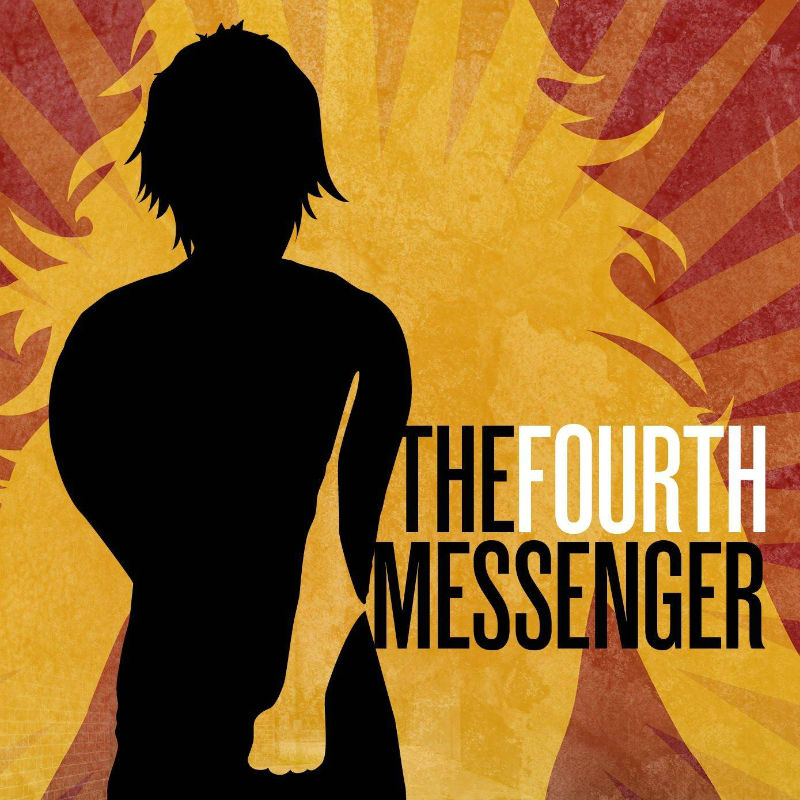
Meditation is meant to focus the mind by clearing away random thoughts. But sometimes meditation may inspire a radical new idea.
Playwright Tanya Shaffer had such an inspiration that led to the creation of The Fourth Messenger, an unusual musical about the Buddha that will be given a concert staging at The Ark on March 14 as a fundraiser for the venue's Spotlight Series.
“The idea came to me on a nine-day silent retreat when I was supposed to be clearing my mind,” she said. “I was thinking about the story of Buddha’s enlightenment, where he sat under a tree and vowed not to get up until he found enlightenment. Then for many days and nights, all the temptations of the world are trying to get him up. And it came to me that would be cool as a song and dance, the temptations standing under a tree and then thinking the whole story would be a musical because it has that scale of a hero’s quest and so I got excited on the retreat and for many hours forgot about my breath and I thought about the musical.”
Wordplay and funny fisticuffs highlight "Jeeves Intervenes" at Ann Arbor Civic Theatre
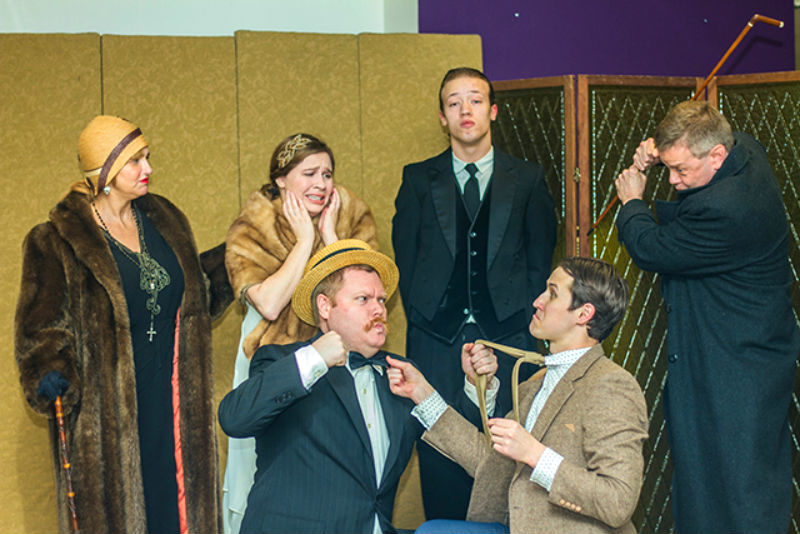
Monty Python didn’t invent the upper-class Brit twit. That honor goes to P.G. Wodehouse with his man-about-town Bertie Wooster.
Wodehouse was a humorist, novelist, short-story writer, Broadway lyricist (teaming with composer Jerome Kern), and man about town in the 1920s when he created Bertie. But he didn’t leave his inept creation without support, because he also created a witty man’s man, the very epitome of the valet, Reginald Jeeves, but always called just Jeeves.
Ann Arbor Civic Theatre will take audiences back to Wodehouse’s fanciful, upper crusty London of the 1920s when it presents Margaret Raether’s stage adaptation of Wodehouse in Jeeves Intervenes, March 12-15 at the Arthur Miller Theatre on the University of Michigan North Campus.
Director Andy Jentzen said it was Wodehouse’s playful use of language and a BBC series that got him interested in Jeeves and Wooster.
Ann Arbor Civic Theatre finds the character-driven "Proof" a good fit on its Second Stage

Theater is sometimes about spectacle: chandeliers that crash before our eyes, ocean liners that seem to sail across a stage, or bloody battles at a Paris barricade.
Alex Duncan was interested in a different kind of theater when she suggested directing David Auburn’s Proof for the Ann Arbor Civic Theatre’s Second Stage. The play’s intimate drama of a troubled young woman and her relationships seemed right for the Civic’s small studio theater and Duncan’s minimalist approach.
“It’s beautiful,” she said. “The language is almost poetic. I’ve always liked dialogue and character-driven things as opposed to, I guess, a little more flash going on. It’s fun digging into the language and working with the characters and figuring out what the actors are going to bring to it and blend that with what I see in the show.”
Duncan, who graduated from Eastern Michigan University with a drama major, directed a Main Stage Civic Theatre production of Arsenic and Old Lace last year and when applications went out for production ideas this year, she proposed Proof. It wasn’t selected for the Main Stage, but in the second round of interviews it was picked for Second Stage.
Theatre Nova actors shine in an otherwise thin "Apple Season"
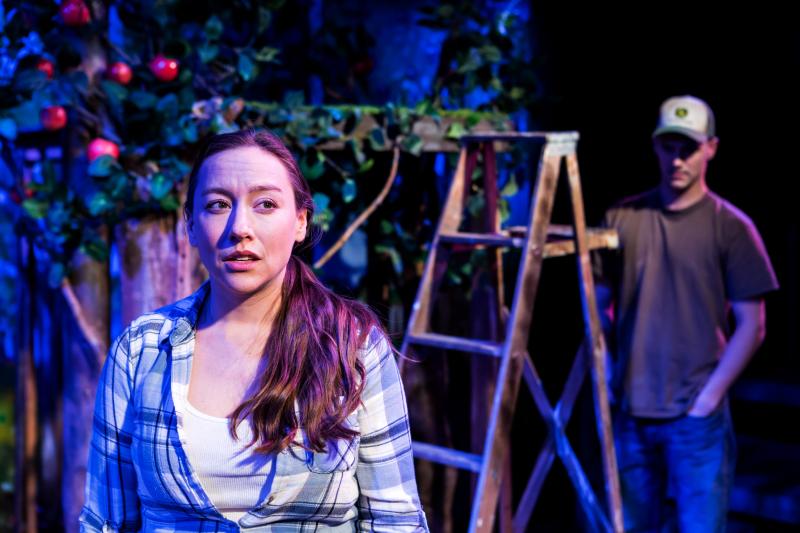
E.M. Lewis’ Apple Season is a memory play. Memories haunt and suffocate three people who have had trouble moving on.
Three excellent actors bring quiet authority to their performances in Theatre Nova’s Michigan premiere of Lewis’ play under the direction of David Wolber. While Lewis’ play strains to be poetic, seems thin, and is too much like other family trouble dramas, but Wolber and his cast bring an honest realism to the story.
Apple Season is a story about dark family secrets, long-repressed emotions, and lost opportunities. Lissie has come back to her Oregon family home to bury her father and decide what to do with the family apple orchard. She is 36 years old, a fourth-grade teacher, and hasn’t been home since running away with her brother to an aunt’s house as a teenager.
U-M brings diversity to Steinbeck’s "Grapes of Wrath"

John Steinbeck’s The Grapes of Wrath is a great American classic.
It is set in a specific time, the Great Depression of the 1930s; specific places, the Dust Bowl ravaged southwest and the fertile promised land of California; and a specific group of people, the migrant Joad family of Oklahoma, one of many families looked down upon as ignorant Okies, traveling with hope for a better life. Yet the story continues to resonate as migrants make their way from Central America to the United States border and from Syria and North Africa to the shores of Europe in search of justice, peace and a chance for that better life.
The University of Michigan Department of Theatre and Drama is presenting a production of Frank Galati’s critically acclaimed stage adaptation of Steinbeck’s novel.
“It seemed timely, relevant, a great American tragedy, a great novel,” said production director Gillian Eaton, an award-winning actress, director, and U-M faculty member.
Theatre Nova fund-raiser showcases a stripped-down version of Sondheim’s "Follies"

Theatre Nova has chosen, appropriately, a showbiz musical as a fund-raiser for the innovative professional theater that specializes in new plays and new playwrights.
This play isn’t new nor are the writers, but the show-business environment and its emotional ups and downs are perfect for reminding theater-goers why live theater matters. Follies, with music and lyrics by Stephen Sondheim and book by James Goldman, is a tip of the hat to obsessions, from being on stage to matters of the heart.
Nova recently received a matching grant of $15,000 from the Michigan Council of Arts and Cultural Affairs and the National Endowment for the Arts. The two-weekend limited run of Follies is one of several fund-raisers to meet the match. Nova is presenting a stripped-down, concert version of the musical that puts the spotlight on the songs and keeps the focus on the central story of two former showgirls and their unhappy marriages. Actors double up on some roles and side plots are eliminated.
The story concerns a reunion of Weismann Follies showgirls (a fictional Ziegfeld). They gather together in an old Broadway theater in 1971, 30 years since they last performed just before the U.S. entry into World War II.
Michigan Made: Theatre Nova’s Playwrights Festival puts the spotlight on new works for the stage

Part two of Theatre Nova’s semi-annual Michigan Playwrights Festival has an added evening that gives more opportunities to shine the spotlight on new playwrights. In addition to staged readings of four full length plays, the festival will set aside an evening for the presentation of six 10-minute plays.
The Michigan Playwrights Festival is in its fifth season, part of Theatre Nova’s focus on new plays and playwrights. Twice a year, a committee selects four plays for presentations in staged readings. The festival will present a play each night Oct. 24-27. The Evening of 10-Minute Plays will be presented Oct. 23.
The four plays selected for the regular festival are The Lion’s Share by Catherine Zudak, Dear Camp by Lisa MacDonald, Silo Tree by Sam Collier, and Blight by R.D. Wakeman.
Playwright Sarah Elisabeth Brown is coordinating the evening of 10-minute plays for Theatre Nova.
“The evening is new to the festival and comes out of a group I started in conjunction with Theatre Nova about a year ago called the Nova Lab, which is designed as a resource to playwrights of all levels who would like to develop their craft,” Brown said in an email interview. “Our signature event is called Prompts for Playwrights and we meet on Sunday evenings when the theater is dark.”


































